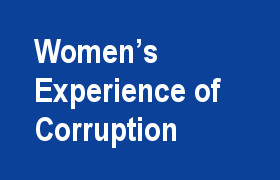Published: 12 March 2015
Women are being forced to accept corruption as a way of life, and at the same time they are becoming victims, agents and in some cases beneficiaries of corruption. A study titled ‘Women’s Experience of Corruption: A Snapshot of Two Unions of Bangladesh’ on 12 March 2015 found. TIB undertook this study with an aim to explore women’s experience of corruption in Bangladesh, which included identifying the nature, dimensions and impact of corruption on women, the socio-economic factors responsible for influencing such corruption experience, and how rural women deals with corruption.In this pre-dominantly qualitative study conducted in two different unions (one located in the affluent district of Gazipur and the other in the destitute Jamalpur district), the study found that social practices in the rural settings are still conservative, banking on the traditional gender roles, which infringes upon women’s freedom of movement. According to the study, rural women perceive an event as corruption only when they are extorted or forcibly coerced into paying money, whereas when they voluntarily indulge in bribery, they don’t perceive it as corruption. Further, they consider resorting to corruption for getting things done as natural and acceptable.The study reveals that women are involved with corruption in three ways: (1) as victims when they are extorted for money while receiving services from various institutions and agencies, (2) as actors of corruption when the women themselves indulge in giving bribery to get things done on a voluntary basis, and (3) as instruments of corruption when women are
|
used by other parties in corrupt practices such as for extracting loans for offices by using the signatures of women and then later using the loan money for other purposes.According to the report, the impact of corruption on women occurs on various levels. Women are affected by corruption at personal and family level through health problems, financial losses, and deprivation of other basic needs and necessities such as education and health services. Corruption also impacts women at social level, especially when corruption becomes institutionalized and erodes moral values and ethics of the whole society and at political level when the empowerment of women, especially, the women politicians is jeopardized.
The study found that social practices in the rural settings are still conservative, banking on the traditional gender roles, which infringes upon women’s freedom of movementAccording the study, women experience more corruption in Bangladesh because of (1) the patriarchal socio-economic structure that ignores women and deprives them of socio-economic equality, (2) lack of empowerment of women, (3) lack of access to various services as well as resources for the women, and (4) lack of good governance in various offices of administration and government. |
|








